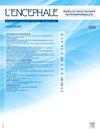在两个诊断中心进行自闭症谱系障碍诊断评估期间的家长参与和适应情况。
IF 1.2
4区 医学
Q4 NEUROSCIENCES
Encephale-Revue De Psychiatrie Clinique Biologique et Therapeutique
Pub Date : 2025-02-01
DOI:10.1016/j.encep.2024.01.002
引用次数: 0
摘要
研究目的本研究的主要目的是确定在所有自闭症谱系障碍诊断评估过程中,与传统上仅在诊断的关键时期让家长参与的程序相比,家长在所有自闭症谱系障碍诊断评估过程中的永久性、中介性参与对家长适应性(感知到的家长压力和家长能力感)的影响。为了完成第一个目标,还对诊断程序的满意度和家长的需求进行了评估。次要目标是评估社会心理、个人和环境变量对家长压力感和家长能力感的影响:方法:49 位家长被分成两个小组(采用简单的随机化方法),每个小组采用不同的程序。参与者在首次咨询前和咨询后各接受了一次咨询。他们填写了关于家长压力、家长能力感、手术满意度、社会支持、控制感和生活事件评价的自我报告问卷。统计分析使用 SPAD 和 SPSS 软件进行:结果:在评估的变量中,两组之间没有差异。两组家长对诊断程序的满意度都很高,但家长们强调他们在诊断后有一些重要的需求。儿童的自主程度、是否存在破坏性行为以及对社会支持的满意度被认为是决定家长适应性的重要因素:有几种假设可以解释为什么两组之间没有差异,其中包括父母可能尚未从旨在使他们融入社会的程序中受益。我们的建议是,专业干预措施应侧重于提高儿童的自主性,并帮助家长建立一个令人满意的支持网络。最后,家长在诊断后阶段的需求应得到更多的考虑,特别是在未来的研究中。本文章由计算机程序翻译,如有差异,请以英文原文为准。
Parental involvement and adjustment during the diagnostic evaluation of autism spectrum disorder at two diagnostic centers
Objectives
The primary objective of this study was to determine the effects of permanent, mediated parental presence during all autism spectrum disorder diagnostic evaluations on parental adjustment (perceived parental stress and sense of parental competence) compared with procedures that traditionally only involve parents in pivotal periods of the diagnosis. The level of satisfaction with the diagnostic procedure and parents’ needs were also evaluated to complete this first objective. The secondary objective was to assess the effects of psychosocial, individual, and contextual variables on perceived parental stress and sense of parental competence.
Methods
The total sample of 49 parents was divided (using simple randomization) into two subgroups, each for a different procedure. Participants were met with once before the first consultation and once after. They completed self-reported questionnaires on parental stress, sense of parental competence, satisfaction with the procedure, social support, locus of control, and appraisal of life events. Statistical analysis was conducted using SPAD and SPSS software.
Results
There was no difference between the two groups in the variables assessed. Satisfaction with the diagnostic procedure was high in both groups, but parents highlighted that they had important needs following the diagnosis. The child's level of autonomy, the presence of disruptive behaviors, and satisfaction with social support were found to be important for determining parental adjustment.
Conclusions
Several hypotheses may explain the lack of differences between the two groups, including that parents may not yet have been in a position to benefit from the procedure aimed at integrating them. Our suggestion is that professional interventions should focus on improving the child's autonomy and helping the parent to develop a satisfactory support network. Finally, parents’ needs for the post-diagnosis phase should be given greater consideration, particularly in future research.
求助全文
通过发布文献求助,成功后即可免费获取论文全文。
去求助
来源期刊
CiteScore
4.60
自引率
7.40%
发文量
162
审稿时长
6-12 weeks
期刊介绍:
Une revue française de renommée internationale.
- Un comite de rédaction représentant tous les aspects de la prise en charge psychiatrique du patient.
- Une sélection rigoureuse d''articles faisant l''objet de plusieurs expertises.
- Des travaux d''auteurs et de chercheurs de renommée internationale.
- Des indexations dans les grandes bases de données (Current Contents, Excerpta Medica, etc.).
- Un facteur d''impact qui témoigne de la grande notoriété de la revue.
La tribune des publications originales de haut niveau.
- Une très grande diversité des sujets traités, rigoureusement sélectionnés à travers des sommaires dynamiques :
- des éditoriaux de médecins référents,
- une revue de presse sur les actualités internationales,
- des articles originaux pour approfondir vos connaissances,
- des mises au point et des cas cliniques pour engager votre réflexion sur les indications et choix possibles au travers de mises en situation clinique,
- des dossiers thématiques pour faire le tour d''une question.
- L''actualité de l''AFPB : L''Encéphale publie régulièrement des comptes rendus de l''Association française de psychiatrie clinique.

 求助内容:
求助内容: 应助结果提醒方式:
应助结果提醒方式:


